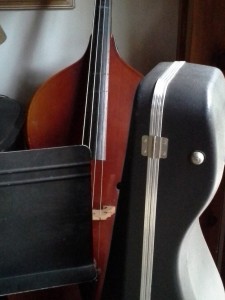As a parent, I had to make a lot of choices about what experiences I would give my kids as they grew up. Maybe it wasn’t really as much of a choice as I thought, since I had grown up in a family where three things counted: Family; hard work; and music. So those were the things that I most wanted to pass down to my kids.
The thought of how these experiences would play out as my kids became adults was not so much focused on what they would become, but who they would become. Music, as a part of life as well as an area of study was a given. So I was constantly surprised and dismayed to meet other parents who viewed their children’s activities, whether in music, art or sports, as a means to an end. And the end was the chance to be the ‘winner’ in whatever activity was pursued. The value that came from the dance recital or the baseball game or the Saturday night football contest was not the intrinsic pleasure of working hard and achieving mastery. It seemed to me that many parents only valued the golden prize that was given as a symbol of victory, whether the victory was real or simply concocted. My youngest was on a number of soccer and baseball teams in his early years…and a cardboard box full of plastic statues and gilded bronze plaques that he was awarded for just showing up still sits in his old bedroom.
That box of discarded trophies was on my mind this week as I thought about the value of early music experiences for young children. In light of the current focus on short term outcomes and ‘winner take all’ mentality that seems to sometimes pervade our society, I was thinking about the real value of all those moments making music. What exactly do young children and families in early music groups get from the experience? What do parents think their child should get from early childhood music experiences?
This same line of thinking must have been somewhere in the air, because writer Joanne Lipman on the Opinion page of the venerable New York Times had somewhat of the same ruminations. What do early music learning experiences give to children that they take with them into adulthood? (The article can be found at http://www.nytimes.com/2013/10/13/opinion/sunday/is-music-the-key-to-success.html.) Ms. Lipman writes about the many successful adults she interviewed who had had serious music training as children and surmises that “…their experiences suggest that music training sharpens other qualities: Collaboration. The ability to listen. A way of thinking that weaves together disparate ideas. The power to focus on the present and the future simultaneously.” This view is much deeper than recent popular attitudes that certain types of music will increase a child’s academic skills (think of all those Baby Mozart DvDs).
Having lived through child rearing that included lots of music experiences and lots of music lessons, I have also put together a list of qualities that I think are developed through music making for the sake of music making. I hope these parenting decisions to include music as a ‘given’ and not as a ‘pathway’ has contributed to who my children are, not necessarily what they are.
Achievement over Awards
When music learning and early music experiences are provided to children as part of their normal development, the satisfaction of being musical is the ultimate reward. That musicality becomes a part of how they operate in the world and stays with them for a lifetime. When those plastic trophies sit in a box and gather dust, the ability to pick up an instrument or sing a song remains alive, present and can be activated throughout a lifetime.
Collaboration over Crowns
Music is almost always a social experience where collaboration with others is part of the experience. This collaboration can be as complex as the minute adjustments that a violinist needs to make in pitch to match that of the others in his orchestra section; or a simple as a pair of two year olds clapping their hands faster and faster just to keep up with each other’s musical conversation. The joy of mutual music making, of collaboration, is the crowning achievement. No manufactured tiaras necessary.
Listening over Laurels
Every active music experience requires, or maybe demands, an ability to listen in a manner that is very different from other types of listening. Rather than being like a straight line, listening in music can seem like the lines of a geodesic figure. A total surround of sounds, ideas, feelings , movements and actions. And it all has to be connected and stay connected. Lots of work! The skills that are developed by being exposed to this type of listening prepares the brain and the body (and the heart and soul) to listen more deeply and intently throughout life. The more children listen within music, the more the music speaks to them. And when the music speaks to them, they don’t find laurels of the superficial kind to be necessary.
Purpose over Prizes
When I watch a group of children making music, I am always struck by the intent focus in their eyes and the determined lines of a greater devotion that creases their face. The music making becomes the purpose. I have seen as well as personally felt that satisfied ‘sigh’ at the end of a passionate song or intense tune. The prize is that internal feeling of fulfillment, rather than an external Prize controlled by another person. This prize of a purposeful and meaningful activity is one that I can make myself and keep myself.
So, whether providing an early childhood music experience or bringing a child to a music group, adults can send a message to young children about why music is important. Again, for me and my children, I hope the message I sent was that music was more about who they would become rather than what they would become.
As always, I would love to hear your views about music and young children. Thanks for reading!




